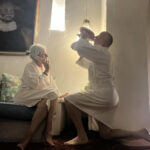How One Curry Might Have Cost A Melbourne Band Superstar Status
An article about Mark Seymour’s book Thirteen Tonne Theory.
Author: Carolyn Webb, The Age.
Date: 1 March 2008.
Original URL: http://www.theage.com.au/news/national/how-one-curry-might-have-cost-a-melbourne-band-superstar-status/2008/02/29/1204226991503.html
More hunting than collecting: In his new book, Mark Seymour regrets that his band did not achieve greater popularity.
Photo: Angela Wylie
At their best, live, Australian rock band Hunters & Collectors were as good as Irish superstars U2, says Mark Seymour, the Hunnas’ lead singer, guitarist and songwriter.
By the time it folded, in 1998, the group that started in 1980 as a post-punk outfit at a grotty St Kilda nightclub was filling stadiums around Australia. Such songs as Holy Grail, When the River Runs Dry and Throw Your Arms Around Me, were anthems.
But why did they never crack the US, why didn’t they hit the big time? Was throwing everything he had into 18 years of “constant grind and travel” (from the lyrics of Say Goodbye) worth all the effort?
Seymour tries to answer those questions in his tough, forthright new biography of the band, Thirteen Tonne Theory, which comes out on Monday.
The title refers to the weight of truck needed to accompany the band on tour when it started tasting serious local success in the early 1990s.
But it equally refers to the baggage of inter-band relationships, the pressures of pandering to fickle American record company executives, and the need to weigh up commercial success against the desire not to “sell out”.
Seymour, now a solo artist living in Melbourne with his wife and two children, describes Thirteen Tonne Theory as a “series of snapshots” of a bunch of university-educated, “dorky-looking” blokes who became, he claims, “the most successful pub band in Australia’s history”.
The stories Seymour tells include:
– How the band started as the Schnorts, a group of students living at Ormond College at Melbourne University who played 1960s kitsch such as To Sir, with Love.
– Hunters & Collectors’ early gigs at the Crystal Ballroom in St Kilda, where instruments included a hot-water tank and a synthesiser programmed to sound like whales mating.
– The “curried chicken” incident in a London restaurant in 1983 in which band members, including Seymour, wrecked their freshly signed, three-record deal with Virgin Records by telling Virgin executive Simon Draper he was “a poncy little blueblood” who didn’t have faith in them. Seymour says Draper told his staff the next day: “They’re dead. They’ll never work in this town again.”
– The nightmare gig at a speedway in Coolangatta, Queensland, when the stink of a rubbish dump blew over the crowd, it rained in torrents, and the MC asked a crowd member to “show us your tits” (she did). The only people paying attention to the Hunnas’ set were two scowling girls who had the words “Doc’s Bitches” printed on their T-shirts — they were fans of the main act, Doc Neeson’s band, the Angels.
– How Seymour thought performing at the MCG —in terms of sound quality — was “a joke”, compensated for by turning up the volume. And although Holy Grail became an unofficial AFL theme song, Seymour doesn’t follow football.
In the book, Seymour goes to great lengths to explain why he now disagrees with the band’s policy to divide copyright among all band members, even though he wrote or co-wrote all the band’s major hits.
Not because he would like the extra income, but because it would mean that he had creative control over what is done with those songs; for example, their use in TV commercials.
He says he still finds it hard to accept that his own vanity, a craving to remain in such a hot live band, overrode his “better judgement” to demand a fairer share of copyright — to rock the boat may have led him to be voted out by bandmates.
Seymour says that musically, “on our best nights we were up there with the best bands in the world,” even U2. But they didn’t get near U2’s global heights of popularity, and it grates.
“I was very frustrated with what happened with the band. I mean, I put everything into it. All of me. I walked away from relationships … in order for that band to be globally successful. And that didn’t happen. The band didn’t reach the levels of success that I dreamed it would.
“It was never enough. But you tell me one band that ever retires believing they couldn’t have been more successful.”
Seymour hopes the book changes perceptions of what the band did. “I think it’s kind of become a vague nostalgic recollection of a handful of songs. And there was just a whole lot more that went into it than that. There was a whole community of individuals who co-operated for a very long period of time to try and achieve something, and the book touches on all that fairly personally and emotionally.”
Mark Seymour will speak about Hunters & Collectors at 6.30pm on March 14 at Readings, 309 Lygon Street, Carlton. Bookings essential, 9347 6633.
N/A.





